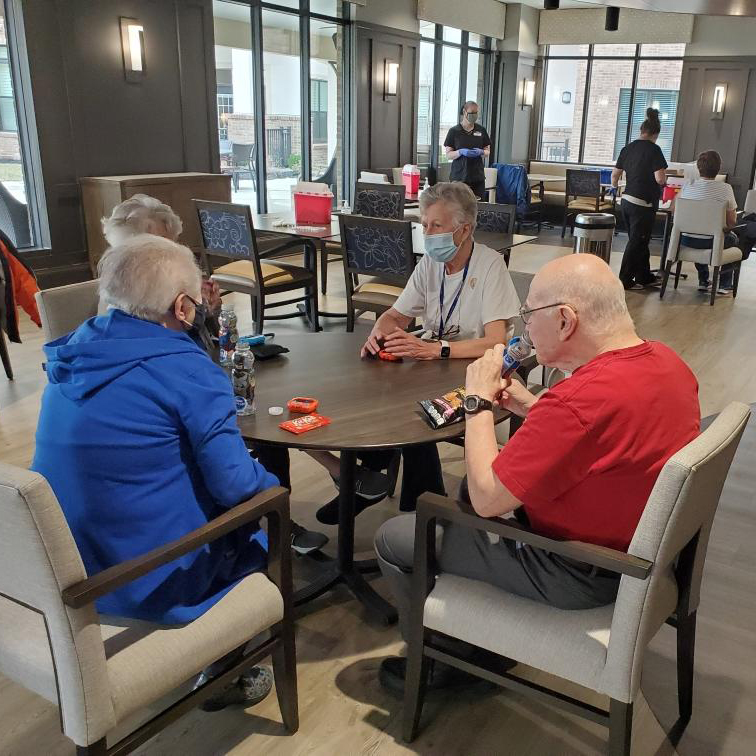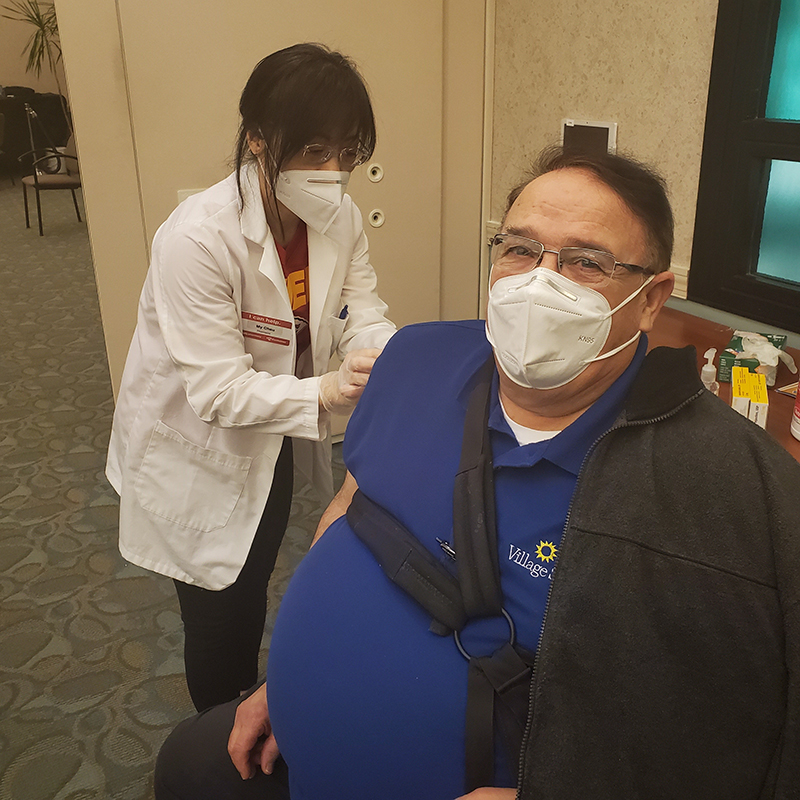Review comes after completing vaccination clinics
While remaining vigilant against the spread of COVID-19, Village Shalom officials hope to gradually loosen up restrictions on visits and programming in the coming weeks.
“I think these next three months is where we will see a number of changes in terms of opening up services,” Village Shalom CEO Matt Lewis told The Chronicle. It remains to be seen what these relaxations might mean for family time during Passover.
Village Shalom is considering the moves following a weeks-long effort to vaccinate residents and staff against COVID-19. It held the last of its clinics late last month.
The senior living community vaccinated a total of 360 people with the two-dose regimen.
That includes nearly 220 residents, both in independent-living villas or apartments, along with people in memory care and other units. The remaining number included nursing staff and workers in other departments, such as transportation, dining and administration.
Village Shalom vaccinated about 95% of its residents, and about 40% of its staff. The staff figure is consistent with the industry standard, Lewis said, based on what he has heard and read.
The relatively low vaccination rate of healthcare workers has been a concern nationally, raising worries about continued transmission to patients and nursing-home residents. Healthcare workers have expressed reservations about the safety of the vaccine along with other concerns.
Data released last month by the U.S. Centers for Disease Control and Prevention said that about 38% of staff in skilled nursing facilities had taken their first shot of the vaccine. The data came from the partnership the federal government has with national providers focused specifically on long-term care settings. Partners in that effort included CVS Pharmacy and Walgreens.
“The program achieved moderately high coverage among residents; however, continued development and implementation of focused communication and outreach strategies are needed to improve vaccination coverage among staff members in SNFs and other long-term care settings,” the CDC concluded.
The staff uptake at Village Shalom was improved from its first vaccination clinic on Jan. 15, where about a third of the staff signed up for the first shot.
In terms of allowing for more activities, Lewis said one hope is to provide greater access to salons.
Village Shalom also has newly constructed apartments, and throughout the pandemic, food service has only been carry-out. He hopes that residents can soon eat in the dining room with appropriate social distancing.
Other amenities that Lewis hopes to bring on line in the coming weeks are the 35-seat theater and common areas in the apartments.
Family visits are “critically important,” Lewis said, so Village Shalom is certainly focused on facilitating more of those.
As for Passover, Lewis said, “We will have to look at that. We have been doing virtual type Jewish holidays, so we are looking at everything.”

Everyone is a year into the pandemic, so even discussing loosened restrictions is nice, Lewis said. “It kind of feels like a breath of fresh air,” he said.
One big development during the past six weeks was securing appointments for independent living residents, said Paige Wheeler, Village Shalom’s vice president of healthcare. Village Shalom worked with its contract provider, AuBurn Pharmacy, on those clinics.
Independent Living residents were not included in the initial vaccination guidelines, which were aimed at more vulnerable populations. Wheeler was happy to accommodate independent living. She fielded a lot of anxious phone calls from those residents.
“I could feel their frustration,” she said. Wheeler said there was an “enormous level of relief” when staff announced the clinic for independent living.
Acknowledging that we are still “very much in the middle of COVID,” Wheeler said Village Shalom is not relaxing mask-wearing and social-distancing protocols. Village Shalom is also continuing routine COVID testing of staff.
The facility is also continuing only to use its north entrance, where staff conducts temperature checks of visitors and has them fill out a questionnaire.
Wheeler ran into several roadblocks in trying to schedule the first vaccination clinic in January. But she said that the process went much smoother in the subsequent clinics.
The biggest change in the facility now that vaccination clinics are finished is a sense of relief, she said. “I see that in our residents, for sure,” Wheeler said, “and also in our staff.”
Managing expectations among staff and family is now one of the biggest challenges. Staff has to explain that everything can’t just go back to normal with COVID-19 still very much present in the community.
Opening up too quickly would be a mistake, Lewis said. The process is not going to be perfect, he said, but one thing is for sure, he said: “We don’t want to go backward.”



